 3 citations,
October 2020 in “Plastic and Aesthetic Nursing”
3 citations,
October 2020 in “Plastic and Aesthetic Nursing” The document concludes that available medical treatments for common hair loss disorders are generally safe and effective, and the emotional impact of hair loss should be considered in treatment plans.
3 citations,
October 2019 in “CRC Press eBooks” Isotretinoin effectively treats severe acne but can cause significant side effects like dry skin and hair loss.
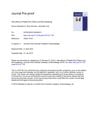 3 citations,
August 2019 in “Journal of The American Academy of Dermatology”
3 citations,
August 2019 in “Journal of The American Academy of Dermatology” PRP with microneedling is generally safe but can cause minor side effects like scalp itching, temporary hair shedding, and swollen lymph nodes.
 3 citations,
April 2019 in “Journal of Dermatological Treatment”
3 citations,
April 2019 in “Journal of Dermatological Treatment” Caffeine shows promise for treating some types of hair loss, but more research is needed.
 3 citations,
January 2019 in “Skin Research and Technology”
3 citations,
January 2019 in “Skin Research and Technology” Frequent use of hair straighteners can cause hair loss similar to scarring alopecia in young Turkish women.
 3 citations,
January 2017 in “Journal of Pakistan Association of Dermatology”
3 citations,
January 2017 in “Journal of Pakistan Association of Dermatology” Women with certain types of hair loss may have low iron levels, and iron supplements could help.
 3 citations,
January 2017 in “Journal of cosmetology & trichology”
3 citations,
January 2017 in “Journal of cosmetology & trichology” The food supplement with L-cystine, Serenoa repens extract, and biotin safely reduced hair loss and improved hair growth in men and women.
 3 citations,
November 2016 in “Clinical Pediatrics”
3 citations,
November 2016 in “Clinical Pediatrics” A girl with Crohn's disease developed hair loss from her medication, which improved with treatment but later returned.
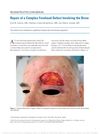 3 citations,
April 2016 in “Dermatologic Surgery”
3 citations,
April 2016 in “Dermatologic Surgery” A man's forehead and eyebrow were successfully reconstructed with a skin and hair graft that matched his other eyebrow, without needing frequent trimming.
 3 citations,
July 2012 in “British journal of hospital medicine”
3 citations,
July 2012 in “British journal of hospital medicine” The guide helps clinicians diagnose and manage hair loss, detailing examination techniques and treatments for different types of alopecia.
 3 citations,
July 2012 in “Hair transplant forum international”
3 citations,
July 2012 in “Hair transplant forum international” Hair transplantation can be safe for well-controlled, stable psoriasis patients with proper care.
 3 citations,
January 2012 in “Elsevier eBooks”
3 citations,
January 2012 in “Elsevier eBooks” The document says that there are treatments for hair and nail diseases.
 3 citations,
January 2012 in “Wageningen Academic Publishers eBooks”
3 citations,
January 2012 in “Wageningen Academic Publishers eBooks” Hair health depends on various factors and hair loss can significantly affect a person's well-being; understanding hair biology is key for creating effective hair care treatments.
 3 citations,
June 2006 in “Expert Review of Dermatology”
3 citations,
June 2006 in “Expert Review of Dermatology” The document concludes that hair loss is complex, affects many people, has limited treatments, and requires more research on its causes and psychological impact.
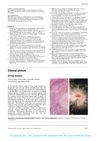 3 citations,
April 2002 in “The Lancet”
3 citations,
April 2002 in “The Lancet” Painful hair loss in an elderly woman was caused by giant cell arteritis, not just aging.
 3 citations,
January 2002 in “Transgenic Research”
3 citations,
January 2002 in “Transgenic Research” Scientists made a mouse that can be made to lose hair and then grow it back.
 3 citations,
December 1997 in “Pediatric Clinics of North America”
3 citations,
December 1997 in “Pediatric Clinics of North America” Pediatricians should advise sexually active teens on safe sex and STD prevention, and discuss contraceptive options and their side effects.
 3 citations,
September 1992 in “The Journal of Dermatologic Surgery and Oncology”
3 citations,
September 1992 in “The Journal of Dermatologic Surgery and Oncology” The conclusion is that modifying scalp lifting surgery by cutting one occipital artery and making other changes reduces complications and improves outcomes for patients with severe hair loss.
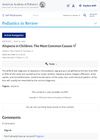 3 citations,
July 1990 in “Pediatrics in Review”
3 citations,
July 1990 in “Pediatrics in Review” Most children's hair loss is due to alopecia areata, stress-related shedding, scalp fungus, or hair-pulling.
 3 citations,
January 1989 in “PubMed”
3 citations,
January 1989 in “PubMed” The review found that specific changes in scalp tissue can help diagnose different types of hair loss.
 3 citations,
February 1985 in “PubMed”
3 citations,
February 1985 in “PubMed” Stopping the beta-blocker nadolol led to quick hair regrowth and improved scalp condition.
 3 citations,
October 1982 in “Postgraduate Medicine”
3 citations,
October 1982 in “Postgraduate Medicine” Most types of hair loss can regrow naturally, but there are no effective cures for male pattern or age-related hair loss, and only limited options for females.
 2 citations,
January 2023 in “Dermatology practical & conceptual”
2 citations,
January 2023 in “Dermatology practical & conceptual” COVID-19 diagnosis is linked to new or worsening hair diseases, with stress from the pandemic likely contributing.
 2 citations,
January 2023 in “Journal of Clinical Medicine”
2 citations,
January 2023 in “Journal of Clinical Medicine” People with hair loss conditions may also have thyroid disorders, but more research is needed to understand the connection.
 2 citations,
January 2023 in “Journal of Dermatology”
2 citations,
January 2023 in “Journal of Dermatology” Some types of hair loss can continue for a long time after recovering from a severe drug reaction known as DRESS.
 2 citations,
September 2022 in “Cureus”
2 citations,
September 2022 in “Cureus” Almost half of COVID-19 patients in Makkah, Saudi Arabia experienced increased hair loss, especially women and those with chronic diseases.
 2 citations,
May 2022 in “Cutis”
2 citations,
May 2022 in “Cutis” Taking too much Albendazole can cause hair loss and other serious side effects.
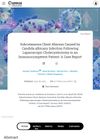 2 citations,
April 2022 in “Cureus”
2 citations,
April 2022 in “Cureus” A healthy woman got a chest abscess from a fungal infection after gallbladder surgery, which was treated but caused temporary hair loss due to the antifungal medication.
 2 citations,
January 2022 in “Clinical, Cosmetic and Investigational Dermatology”
2 citations,
January 2022 in “Clinical, Cosmetic and Investigational Dermatology” The refined wash test is a reliable way to measure daily hair loss and can tell the difference between different types of hair loss.
 2 citations,
September 2021
2 citations,
September 2021 The COVID-19 pandemic increased the use of teledermatology to treat skin conditions in low-income areas, despite challenges like poor photo quality.




























